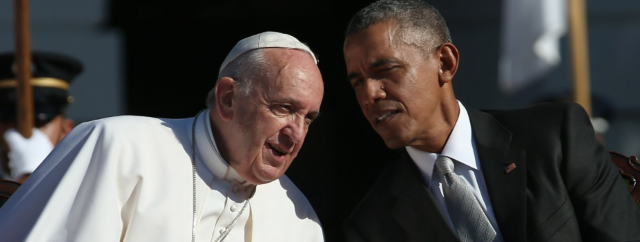NEWS Pope Francis’s global metaphor for wealth and climate
NPR Piece with Scott Tong on the Climate Encyclical (September 22, 2015)
Pope Francis, in speaking about climate change this week, is likely to use the term “global north and south.” The term isn’t heard much in the United States. But it is the pontiff’s view of where the world’s wealth tends to be, and where the environmental effects caused by development are.
Before the white smoke at the Vatican declared him pope, he was sometimes called Bishop of the Slums at home in Argentina. He frequented the so-called “misery villages” of Buenos Aires.
“Argentina at the beginning of the 20th century was one of the wealthiest countries in the world,” said professor Joseph Kaboski, who teaches economics at Notre Dame. “And they’ve fallen. Now they’re a middle-income country. So material poverty is a bigger issue in a place like Argentina.”
Places, that is, where inequality is relatively high.
As far as the world’s rich and poor, the pope speaks to an “ecological debt” between the global north and south.
The southern hemisphere is poorer than the northern, and still-developing countries, mainly in the south, suffer outsized effects from mining and drilling for minerals and energy.
They also suffer outsized effects of climate change, said economist Jeffrey Sachs of Columbia University’s Earth Institute. He advised the pope’s Vatican council on climate.
“The pope is making a point that they are already suffering miserably from increasing environmental degradation,” Sachs said. “And they are likely to suffer the most, the earliest.”
A defining paper on climate economics, called the Stern Review, found developing countries tend to be warmer to start out. They rely more on farming and stable rain patterns. When the rains aren’t, Sachs said, it looks like Syria.
“The droughts were unrelenting — leading to crop failures as well as soaring food prices,” he said. “And that turned into mass protests, government crackdowns, and into a bloodbath and a catastrophe.”
Syria, of course, is not in the southern hemisphere, but the pope’s construction of a global north and south is also a metaphor.
“The north and the south is a commonly used dichotomy to divide the rich and the poor,” said Brian Murray, an environmental economist at Duke University.
There is a policy implication here: The Kyoto climate treaty — the basis of global climate change talks — and the pope’s encyclical assume rich countries bear more responsibility for addressing climate change.
As the thinking goes, they industrialized and polluted first, and their greenhouse gases can linger for centuries.
“What this will do, though, is provide the developing countries some bargaining power, if you will, by reference to the moral authority of the pope,” Murray said.
The focus on poor and rich has drawn criticism in the U.S.: that the pope is Marxist, which he’s denied; or that he’s reviving a doctrine of preference for the poor known as Liberation Theology.
At the very least, this is meant to shake up the rich countries, Berkeley energy physicist Dan Kammen said. He also advised the Vatican.
“We don’t want to reduce the quality of life,” he said, “we want to reduce the footprint of that life. And that hasn’t been emphasized so much in Western capitalist economies. But it’s where we’re starting to see a very interesting conversation around living within our resource means.”

You must be logged in to post a comment.